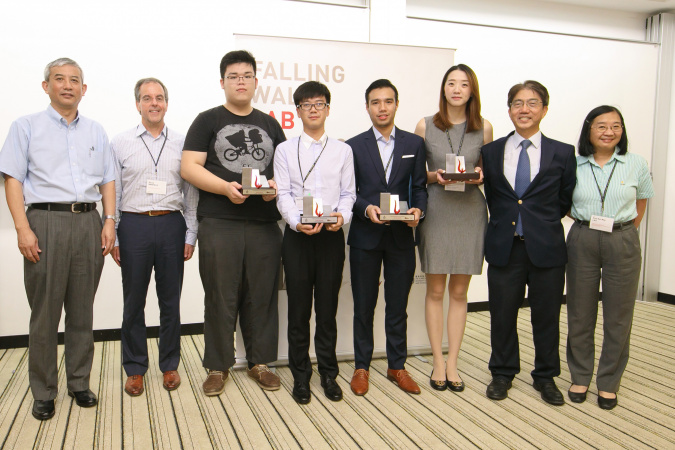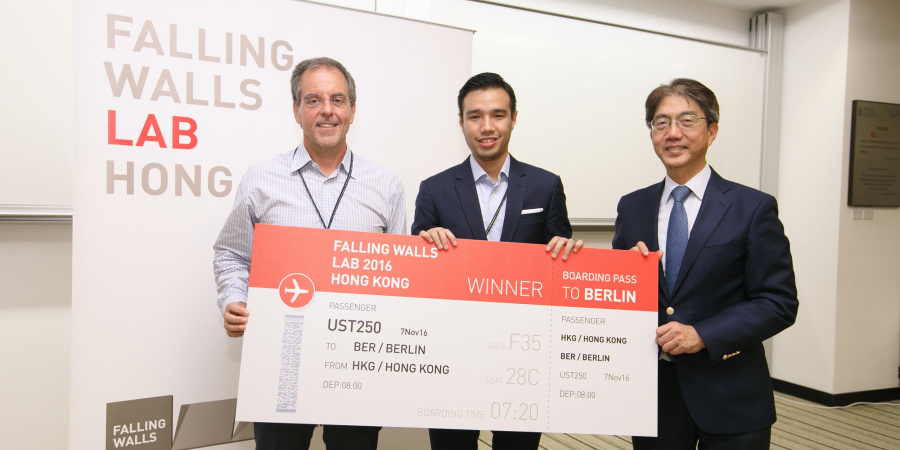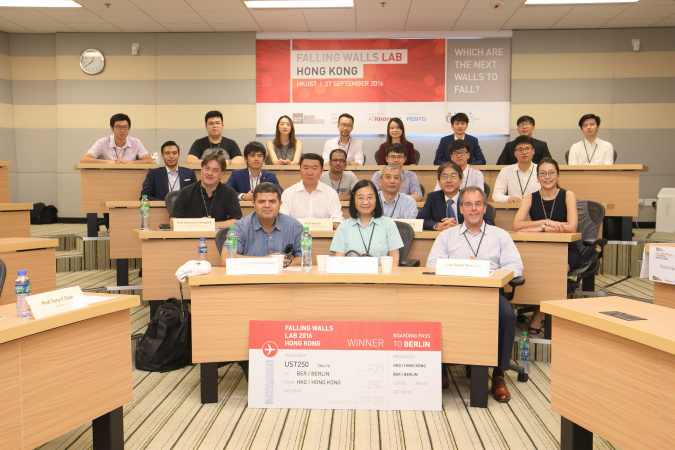SENG Makes a Clean Sweep in the First Falling Walls Lab Hong Kong at HKUST
There was a clean sweep of the awards in the first Falling Walls Lab Hong Kong at HKUST for School of Engineering students, who took the 1st, 2nd and 3rd places. Exclusive for HKUST members, the Lab offers young talents, innovators and entrepreneurs an exciting opportunity to present their innovative ideas, research projects or social initiatives in 3 minutes with just 3 slides. It is a platform for bright minds to present groundbreaking ideas that spark discourse and have great potential to impact our future. The event was held on 27 September and organized by the University’s Research Office and Office of the Vice-President for Research & Graduate Studies.
The 1st place went to Mechanical and Aerospace Engineering PhD student Daniel Josephus Villaroman for his presentation on “Breaking the Wall of Insufficient Solar Power”. The performance of commercial solar panels has reached a limit because the spectrum of light they can absorb and convert to electricity does not match well with the light we depend on from the sun. To address this problem, Daniel proposed to concentrate sunlight to heat up a specialized chemical emitter, which delivers a light spectrum that matches well with traditional solar panels, for exceptional power generation and efficiency. As the winner of the competition, Daniel will go to Berlin to present his ideas on a world stage at the Falling Walls Lab Finale, and attend the Falling Walls Conference, a prestigious annual global gathering of forward-thinking individuals from 80 countries, on 8-9 November 2016. Daniel is also a 2012 BEng graduate in Mechanical Engineering from HKUST.
Civil and Environmental Engineering PhD student Weiqi Xue gained 2nd place for his presentation titled “Breaking the Wall of Waste to Pharmaceuticals”. He proposed producing sulfated polysaccharides from excess sludge, an inevitable waste from biological wastewater treatment, as an alternative to extraction from algae. Currently sulfated polysaccharides that are used as food additives, cosmetic materials and pharmaceuticals can only be extracted from algae, causing insufficient supply and high price of the related products. Weiqi also received a MSc in Environmental Engineering and Management from HKUST in 2014.
Two awardees tied for 3rd place, who are Po Sang Lo, Chemical and Biomolecular Engineering MPhil student and 2016 BEng graduate from the same department, and Yun Xu, PhD student of Civil and Environmental Engineering. Po Sang proposed a next-generation graphene-based blood purification technology called perfusion to address the problem of dialysis as a result of kidney failure. Yun proposed a new curved retaining wall which has a better performance than conventional straight retaining walls.
The presentations are evaluated based on three criteria: the degree of innovation, originality and breakthrough; impact to society; and clarity and articulation of vision and proof of concept. The panel of judges includes faculty members from Schools of Science, Engineering, Business and Management, and Humanities and Social Science.
The Falling Walls Lab is an international forum, which aims at building and promoting interdisciplinary connections between young excellent academics, entrepreneurs and professionals from all fields. Launched in 2011 in Berlin, the Lab was subsequently brought to a number of international cities and has taken place in more than 30 countries so far. The Falling Walls Lab Finale is held each year in Berlin on 8 November, gathering 100 participants from all over the world, among them all winners of the international Falling Walls Labs. The winners also have the opportunity to attend the Falling Walls Conference, organized each year on 9 November – the anniversary of the fall of the Berlin Wall – where world’s leading scientists present their current breakthrough research.
The Falling Walls Lab and Conference are organized by the Falling Walls Foundation, a non-profit organization in Berlin, dedicated to the support of science and the humanities.



